From 20 to 25 July 2014 the City of Melbourne, Australia, will host the 20th edition of the International AIDS Conference (AIDS 2014), organized by the International AIDS Society. The Key Correspondent Team has received many complaints regarding a lack of information and a negative bias in reviewing abstracts, workshop proposals and scholarship applications. In a previous article, AIDS 2014: Another international disappointment?, we reflected on the near absence of information available in Spanish.

In April we held a virtual survey throughout the region which received almost 400 responses. Of these, 350 complete, unique (from a single source) responses were processed. In this article we will share some of the more relevant results and venture an analysis.
Fifty percent of people who responded to the survey have participated in one or fewer of the last three editions of the event. As expected, 40% of those who have participated at a World Conference did so at the only one held in Latin America, at Mexico City in 2008.
Access to conference information
Of those surveyed, 62% considered that there was no information available about the conference or that the information was inadequate (see Figure 1). A third of those surveyed did not receive any information about the event. Of those who received information, a third had access to it in the last six months and another third in the last month or less. In this latter case the main key dates for the Conference had all expired. In this respect, only 36% of those surveyed said that they had received the information early enough to submit abstracts, workshop proposals or scholarship applications.
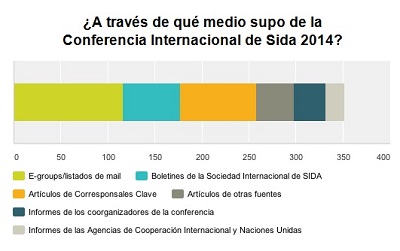
As we predicted in the above-mentioned article, there has not been any conference information available in Spanish and this claim is backed up by 78% of those surveyed, who indicated that they only had access to conference information in English. Half of those surveyed received information via e-groups, 35% from Key Correspondents and 27% via bulletins from the International AIDS Society (see figure 2).
Abstracts and scholarships
33% of those interviewed submitted one or more abstracts to the conference with a success rate of 13%, meaning that for every ten abstracts, a little more than one abstract has been approved for publication or presentation at the event. 90% of those who submitted a summary to the conference did not have access to a template or instructions in Spanish and this alone explains why there was such a low success rate.
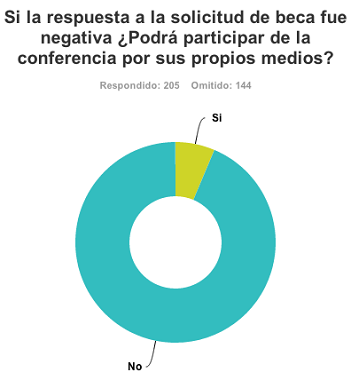
A third of participants (36%) have applied for a full AIDS 2014 scholarship, while 10% applied for partial scholarships. Of all those who applied for any kind of scholarship, only 4% received a positive response. Of those surveyed, only 8 people will receive any financial support from the organisers to participate in the event. As figure 3 shows, most of those surveyed depend on a scholarship to be able to participate. Access to scholarship applications in Spanish shows similar rates as access to instructions in Spanish for abstracts.
On the conference organizers
75% of those surveyed did not know who, along with the IAS, co-organizes the World Conference (figure 4) and only 30% of participants know that membership of the International AIDS Society is not exclusive to health professionals. Only 8% responded that they knew who was on the IAS governing council representing Latin America and the Caribbean and only 10 people could correctly name at least one or more of its members.
We are clearly lacking information in Latin America about the people responsible for the conference, as well as about who represents us on the governing council.
Survey respondents
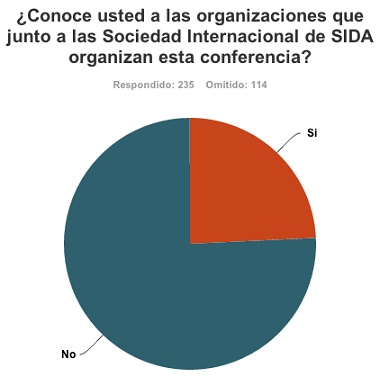
The universe of participants in this survey has been very balanced, with significant participation from trans people (figure 5), people living with AIDS, young people, LGBTI, activists and professionals. 26% of those surveyed also identified themselves as health professionals. All the countries of Latin America and the Spanish-speaking Caribbean participated in the survey.
We are very grateful for the participation of the 350 people surveyed, who also put forward much more qualitative information which we will continue to analyse. Some of the kee words identified when people were asked about the reasons the had for attending the conference, they mentioned they wanted to «stay up-to-date», «learn», «advances», «share experiences», «access to information».
Figure 6 shows a cloud with the key words those surveyed offered as to why they consider participation important.
To honour the valuable contribution of those surveyed we will end this article with some of their comments:
– “They should give an opportunity to new people who are starting out in activism, unfortunately it’s always representatives of international networks who go”.
– “The IAS council should be held accountable for this unfortunate exclusion of our region”.
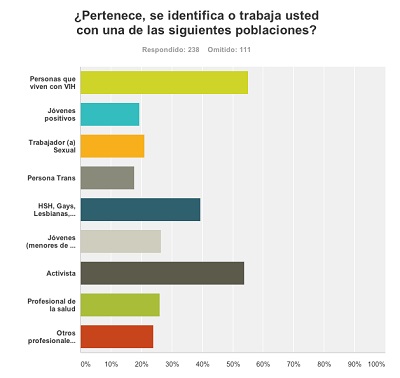
– “We Latinos who don’t speak English are often marginalized because of it. However, we have a lot to offer in terms of experience from the work we’ve done (…)”.
– “The conference’s official page should also be translated into Spanish, at least the relevant aspects like the abstract form, the abstract tracks, scholarship forms. This would be a great help to those who don’t speak fluent English.”
– “Scholarships by region should be more proportional, so as to give more equal representation to the civil society of all the countries.”
– “The cost of these conferences makes them hard to attend and elitist.”
– “We must continue to raise our voices to get English-Spanish translations at the conferences, a large number of us in the key population do not speak English.”
– “Not only has information not been provided in a timely fashion or in Spanish, but those who managed to access and use the information and send their abstracts were not accepted.”
– “We need a regional conference.”
– “We never know what the evaluation criteria are, they always reject you,”
– “It is clear that the region must develop other mechanisms for the exchange of successful experiences.”
We know that the first article and this survey have been discussed among the international conference organizers. We at Key Correspondents have contacted the IAS and conference organizers to request official statistics and information and they declined to share some information.
We would like to emphasise our gratitude to all those who expressed themselves through us in this survey.
There isn’t much more to add, so to close with a Latino flavour, we’d like to share an excerpt from “Not So High”, a poem by Pablo Neruda that says: “and if what I know is of no use to them, it is not that I have said nothing, but rather that I have said it all”.





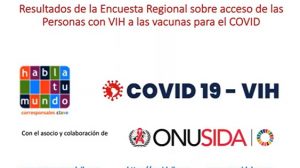
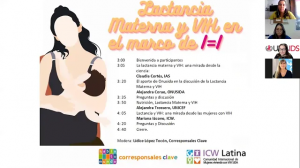
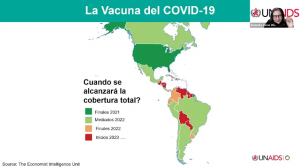
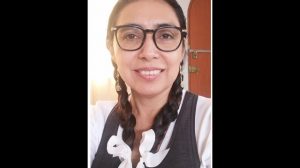
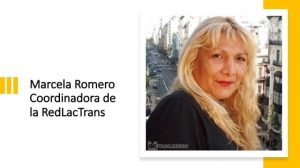
Añadir comentario